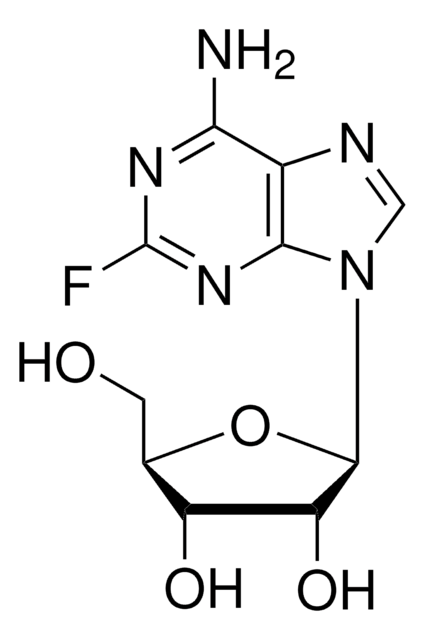SML0653
Capecitabine
≥98% (HPLC)
Szinonimák:
5′-Deoxy-5-fluoro-N-[(pentyloxy)carbonyl]cytidine, Ro-9-1978
About This Item
Javasolt termékek
Minőségi szint
Teszt
≥98% (HPLC)
form
powder
optikai aktivitás
[α]/D +80 to +100°, c = 0.5 in methanol
szín
white to beige
oldhatóság
H2O: 10 mg/mL, clear (warmed)
tárolási hőmérséklet
2-8°C
SMILES string
O[C@H]1[C@@H](O)[C@H](N2C(N=C(NC(OCCCCC)=O)C(F)=C2)=O)O[C@@H]1C
InChI
1S/C15H22FN3O6/c1-3-4-5-6-24-15(23)18-12-9(16)7-19(14(22)17-12)13-11(21)10(20)8(2)25-13/h7-8,10-11,13,20-21H,3-6H2,1-2H3,(H,17,18,22,23)/t8-,10-,11-,13-/m1/s1
Nemzetközi kémiai azonosító kulcs
GAGWJHPBXLXJQN-UORFTKCHSA-N
Géninformáció
human ... TYMS(7298)
Looking for similar products? Látogasson el ide Útmutató a termékösszehasonlításhoz
Alkalmazás
- in combination with gemcitabine to achieve glutamine deprivation by enhancing the sensitivity of expression in pancreatic ductal adenocarcinoma (PDAC) cells to inhibitors of glutamine metabolism and study its effect on PDAC cell survival
- to study the drug metabolic function in a two-organ microfluidic system
- as an anti-cancer agent to study its cytotoxic activity alone or in combination with B87 on cancer cells
Biokémiai/fiziológiai hatások
Figyelmeztetés
Danger
Figyelmeztető mondatok
Óvintézkedésre vonatkozó mondatok
Veszélyességi osztályok
Carc. 1B - Muta. 2 - Repr. 1B
Tárolási osztály kódja
6.1C - Combustible acute toxic Cat.3 / toxic compounds or compounds which causing chronic effects
WGK
WGK 3
Lobbanási pont (F)
Not applicable
Lobbanási pont (C)
Not applicable
Analitikai tanúsítványok (COA)
Analitikai tanúsítványok (COA) keresése a termék sarzs-/tételszámának megadásával. A sarzs- és tételszámok a termék címkéjén találhatók, a „Lot” vagy „Batch” szavak után.
Már rendelkezik ezzel a termékkel?
Az Ön által nemrégiben megvásárolt termékekre vonatkozó dokumentumokat a Dokumentumtárban találja.
Az ügyfelek ezeket is megtekintették
Tudóscsoportunk valamennyi kutatási területen rendelkezik tapasztalattal, beleértve az élettudományt, az anyagtudományt, a kémiai szintézist, a kromatográfiát, az analitikát és még sok más területet.
Lépjen kapcsolatba a szaktanácsadással













